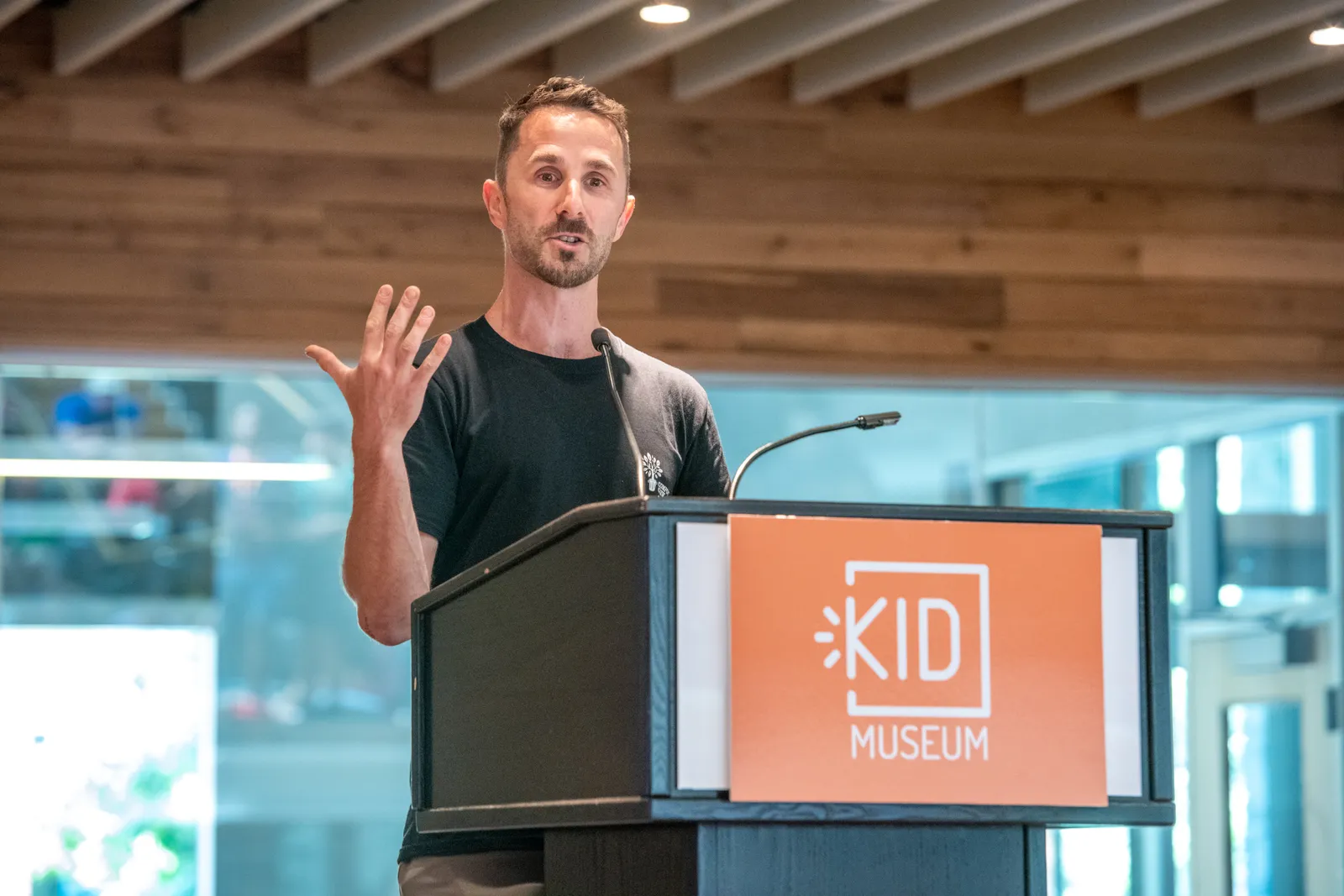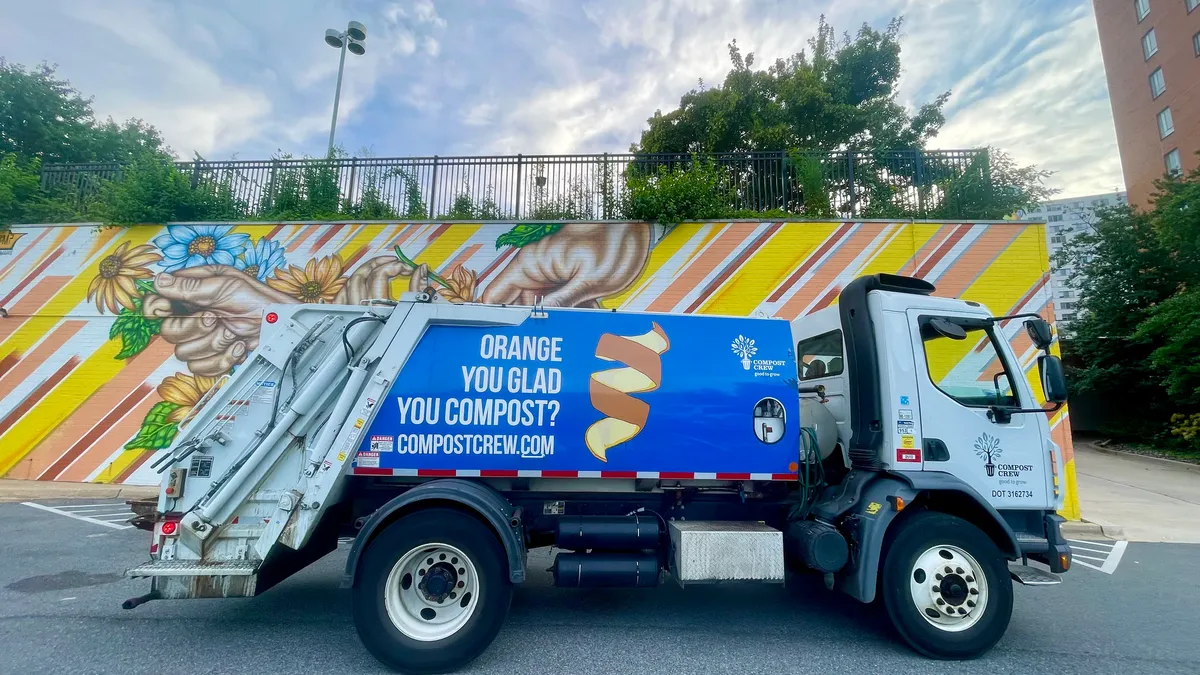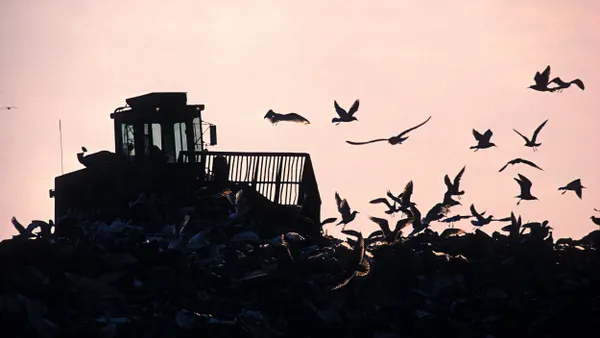Maryland-based Compost Crew is reporting another year of record expansion as organics recycling takes off in the Mid-Atlantic.
The food scrap collection company, which launched in 2011 and describes itself as the region’s largest, more than doubled its annual volumes to over 7,500 tons last year. The recent enactment of an organics diversion mandate for large generators in Maryland helped play a role in growing the company’s customer base, which now totals more than 8,500 commercial and residential accounts. Notable new or expanded commercial accounts include Hungry Harvest, the Maryland Zoo, Whole Foods Market, MedStar Health and George Washington University.
Compost Crew also recently launched a curbside collection pilot program with College Park, Maryland, and expanded to three drop-off sites in various locations. In addition, it will soon have four “Compost Outposts” — modular sites that produce compost for use by farms or other locations — including one solar-powered site. Supporting this growth is an oversubscribed $5.5 million series A funding round in April 2022 along with new management hires.
Waste Dive recently spoke with CEO Ben Parry about these developments, trends in organics collection, the company’s legal shift to a public benefit corporation and more.
The following interview has been edited for length and clarity.
It’s been about a year since your series A raise. What has that allowed you to do that you couldn't do before?

The past couple years have been really tough. It's been a tough year with inflation, with the supply chain, with hiring. So if nothing else, the investment has given us the confidence to continue to grow despite those challenges. On top of that, it's allowed us to continue to invest and just get better at operations, keep expanding the fleet, bring on some talented people — we hired an operations director and an HR director — and continue to become a better company and be prepared to help more municipalities, more commercial locations, as they want to adopt composting.
You reported collecting over 15 million pounds of material in 2022. Is there any one aspect that has led the growth, perhaps the Maryland law or other factors?
The Maryland law is adding momentum, but in general we're seeing a gradual acceptance that food waste recycling and composting is going to be the reality for everybody in the future. So we've seen growth from more municipalities that want to start curbside collection programs and drop-off programs. And we've seen a lot of growth on the commercial side: grocery stores, restaurants, any place that generates food waste.
How has the cost conversation evolved with those customers? Is their goal for this still to be cheaper than disposal, or are they willing to pay slightly more for the added benefits?
Cost will always be an important factor in decisions. Until all of the negative externalities of throwing waste into a landfill or burning it in an incinerator are really factored into the cost of trash, then [composting will] always be more expensive for a good number of locations.
It's not necessarily that we're more expensive than trash and recycling, by the way. It's another bill. Some locations see it as another bill that they have to pay and don't really recognize all of those other environmental benefits, but also benefits to managing their food waste more efficiently, and benefits to their tenants and their employees who are demanding these services.
On the residential side it feels like we’re seeing more momentum for curbside programs around the country. What would you say is driving that?
General awareness. The confidence of other municipalities and communities that are participating in or having success is driving others to follow. We've seen that in the Washington, D.C., metro region, certainly. We started with the town of Chevy Chase [Maryland] and the city of Falls Church [Virginia] five or six years ago and paved the way. Now we serve dozens of municipalities that have have wanted to model their programs on those first movers.
How do the Compost Outpost systems fit into your overall processing needs, and what might it look like to expand that footprint?
It's still a fraction of our total collections that’s going to our own Compost Outposts. So we have three, soon to be four, operating on farms. We integrate them into our route networks so that we reduce both economic and environmental hauling costs by making the routes more efficient. We also partner with farms — and specifically table crop farms — to create a circular economy and produce high-quality compost. So we really focus on high-quality soil amendments that the table crop farm can use to incorporate into its soil and improve the organic matter and nutrients, but also reduce fertilizer costs, which have skyrocketed over the past couple of years with the Russian war in Ukraine and other causes.
So there's a lot of benefits that the Compost Outposts provide, and we want to keep adding more. We are in the process of adding more in partnership with area municipalities and farms. The intent is not to replace our partnerships with the larger composting facilities, like the one owned by Prince George's County [in Maryland] and Freestate Farms in Manassas, Virginia. But it'll certainly complement and provide a very valuable soil amendment to support local food production.
If there's a municipal collection bid that goes out for organics, is this concept a competitive edge for you?
Definitely. Keeping waste local and transparent is a big advantage. We can't send food waste from a million homes to a single on-farm Compost Outpost. But it does inspire behavior change, it shows what's possible.
That’s one problem with other types of recycling: Once it leaves your loading dock, it's just not transparent, you can't see what's happened. And oftentimes it goes overseas because the inputs have to go to where the manufacturing is happening. With our Compost Outposts, you can go drive 15-20 minutes and see the food waste that we're processing with the carbon material, see it get turned into compost and see it being incorporated into the farm. So that's a huge benefit, in addition to the food waste in the compost production, is the behavior change and the education and the transparency that it can produce.
Labor and fleet operations have been challenging in recent years. How did the new hires bolster your organizational structure, and what else has been working in terms of recruitment and retention?
The hiring of our HR director and our operations director have been very significant, both for giving us additional bandwidth to bring in more labor to support our growth, and retention has increased as well. So making sure that we are providing top-of-the-line benefits and instituting best practices, standard operating procedures, and this is a great place to work. And then in terms of hiring new people, it's been a challenge for everybody. I do feel that it's slowly turning a corner, maybe, but it's just about trying a lot of different things and being creative and being persistent. So it's possible, but it's not easy.
You recently shifted to a public benefit corporation status. What does that mean about how you’re going to approach expansion and the way you run your business?
As a public benefit corporation, we're required, according to our articles [of incorporation], to provide the public benefits. So it's not just about maximizing profits for our shareholders. It's also about providing good jobs, it's about carrying out our mission to eliminate food waste and revitalize the health of soils so that we can make the planet a better place to live. So we're focused on improving biodiversity, we're focused on improving the health of our soils to boost local food production. So all of those things are part of our mission, and they ripple through the decisions that we make, including how to grow, who to hire, how to hire and how we operate on a daily basis.
It doesn't limit our growth potential at all. And that's part of the reason that I decided to move over to a public benefit corporation as well, to prove that whether you're a public benefit corporation or a certified B Corp., or even if you don't change your legal status, you can focus on providing the general public benefit while earning a profit and growing and solving a real problem. So it doesn't have to be just to increase monetary value and pay big dividends to investors.












